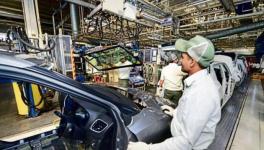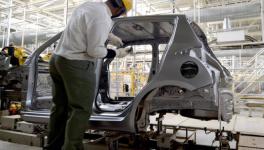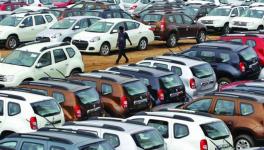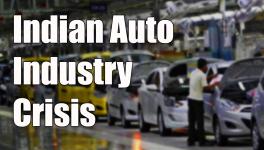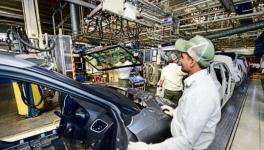Over 10 Lakh Jobs in Danger as Automobile Industry Stares at Deeper Crisis
Image for representational use only.Image Courtesy : The Financial Express
New Delhi: The Indian automobile industry, which has been facing a crisis since September last year due to lack of demand, faces a much deeper crisis with the prolonged slowdown of the economy.
The Automotive Component Manufactures Association (ACMA), an apex body representing the interest of the Indian auto component industry, on Wednesday said that around 10 lakh jobs could be on the line if the slowdown in the automobile industry continues, while seeking immediate government intervention such as slashing goods and services tax to stimulate demand.
ACMA, which represents the auto component industry which alone employs around 50 lakh people, has sought a uniform GST of 18% for the entire automobile sector in order to revive the vertical which has now witnessed 10 months of continuous decline in sales.
Terming the situation as "unprecedented", ACMA President Ram Venkataramani said vehicle sales in all segments have continued to plummet for the last several months thus impacting the component segment as well.
"Considering the fact that the auto component industry grows on the back of the vehicle industry, a current 15-20% cut in vehicle production has led to a crisis-like situation," he said, adding "if the trend continues, the layoffs are inevitable and an estimated 10 lakh people could be laid off".
Along with the people who are employed directly in the industry, workers in related service sector to the automobile industry include small-scale dealers, workshop owners, mechanics etc will also be rendered jobless if the crisis continues, said KK Divakaran, general secretary of All India Road Transport Workers'Federation (AIRTWF), affiliated to the Centre of Indian Trade Unions (CITU).
Read More: Automobile Slump Is Disrupting the Ancillary Industry of Maharashtra
While layoffs have already been initiated with Nissan’s plan to axe around 1,700 workers. Though Nissan says it is the part of their global exercise, India accounts for about 13.5% of the people fired. However, Nissan Motor India in last September itself had come out with the Employee Voluntary Separation Scheme as part of cost cutting due to the industry crisis.
“In Maruti, they have cut short the number of working days. Instead of working seven days a week, the company operates five or six days in a week due to this crisis,” said Divakaran.
When asked if layoffs had started, Venkataramani replied in the affirmative. "In the components industry, nearly 70% of the workforce is on contract. So, whenever there is demand slump, there is reduction in the number of workers," he said.
Subdued demand, recent investments made for transition from BS IV to BS VI emission norms, lack of clarity on electric vehicle (EV) policy has left the industry unsure of its future and has caused it to stop all future investments, he added.
"The industry needs urgent government intervention... We strongly recommend that the government bring 18% GST rate across the entire auto and auto component sector," he added.
Under the GST regime, around 70% of auto components have come under the 18% slab. However, around 30% remain in the 28% bracket. Besides, automobiles currently attract GST rate of 28% with additional cess ranging from 1 per cent to 15 per cent, depending on the length, engine size and type.
“Along with the economic slowdown, which is being aided by the Centre’s policies, the push for the electric vehicles and hike in the prices of diesel and petrol have also affected the industry,” Divakaran said.
Though the government claims that electric vehicles will reduce pollution, some experts claim that the batteries of electric vehicles contain more poisonous substances. Whatever it may be, the push for electric vehicles won’t help industry. Because the components are being imported and only the assembling of components is happening here, Divakaran said.
Public transport will also be affected by electric vehicles, since transport corporations would have to use electric buses instead of petrol or diesel ones. Though the Centre offers subsidy, it is very meagre compared to the overall expense on an EV. So, it would affect the public transport system, which is already shrinking.
“Ultimately, the benefit of promoting electric vehicles will go to multination companies as imports will rise,” said Divakaran.
Incidentally, on Saturday, the GST Council decided to reduce tax rates on electric vehicles from 12% to 5% per cent, and on EV chargers the tax rate has been reduced from 18% to now 5%.
Read More: Govt. Report Reveals Shocking Condition of Workers in India
ACMA’s Venkataramani has also sought for a long-term clarity on government's electrification policy. Commenting on the need for a stable policy for electric mobility, he said any further changes in targets for roll-out of EVs would increase the country's import bill and damage the current components manufacturing ecosystem.
"This will also result in significant job losses. Therefore, a stable technology-agnostic e-mobility policy is the need of the hour to ensure a smooth transition and creation of a string local supply base," he said.
ACMA Director General Vinnie Mehta also stressed the need for a stable overall roadmap towards transition to EVs stating that NITI Aayog's aggressive target to move to EVs had made the auto industry nervous.
The government think tank NITI Aayog has proposed transition to electric vehicles (EVs) for three-wheelers by 2023 and two-wheelers by 2025.
Commenting on sector's performance in 2018-19, Mehta said the auto components business stood at Rs 3.95 lakh crore ($57 billion), registering a growth of 14.5% over the previous fiscal. Auto component exports grew by 17.1% to Rs 106,048 crore ($15.16 billion).
"The first-half of the fiscal 2018-19 witnessed a robust double-digit growth, however, the second-half saw a significant slump in vehicles sales," Mehta said.
The automotive component industry contributes 2.3% to country's GDP providing employment to 50 lakh people. And if the slump continues, it’s the workers who will bear the biggest brunt in a scenario where job creation has hit a low.
Read More: Economy Grew by Only 4.5%, Not 7%, Between 2011-16, Says Modi Govt’s 1st Term Chief Economic Adviser
With inputs from PTI
Get the latest reports & analysis with people's perspective on Protests, movements & deep analytical videos, discussions of the current affairs in your Telegram app. Subscribe to NewsClick's Telegram channel & get Real-Time updates on stories, as they get published on our website.












